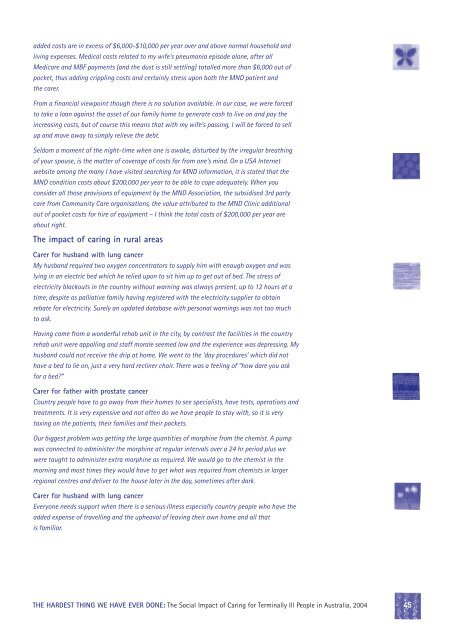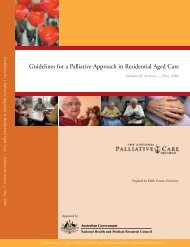The hardest thing we have ever done - Palliative Care Australia
The hardest thing we have ever done - Palliative Care Australia
The hardest thing we have ever done - Palliative Care Australia
Create successful ePaper yourself
Turn your PDF publications into a flip-book with our unique Google optimized e-Paper software.
added costs are in excess of $6,000-$10,000 per year over and above normal household and<br />
living expenses. Medical costs related to my wife’s pneumonia episode alone, after all<br />
Medicare and MBF payments (and the dust is still settling) totalled more than $6,000 out of<br />
pocket, thus adding crippling costs and certainly stress upon both the MND patient and<br />
the carer.<br />
From a financial viewpoint though there is no solution available. In our case, <strong>we</strong> <strong>we</strong>re forced<br />
to take a loan against the asset of our family home to generate cash to live on and pay the<br />
increasing costs, but of course this means that with my wife’s passing, I will be forced to sell<br />
up and move away to simply relieve the debt.<br />
Seldom a moment of the night-time when one is awake, disturbed by the irregular brea<strong>thing</strong><br />
of your spouse, is the matter of coverage of costs far from one’s mind. On a USA Internet<br />
<strong>we</strong>bsite among the many I <strong>have</strong> visited searching for MND information, it is stated that the<br />
MND condition costs about $200,000 per year to be able to cope adequately. When you<br />
consider all those provisions of equipment by the MND Association, the subsidised 3rd party<br />
care from Community <strong>Care</strong> organisations, the value attributed to the MND Clinic additional<br />
out of pocket costs for hire of equipment – I think the total costs of $200,000 per year are<br />
about right.<br />
<strong>The</strong> impact of caring in rural areas<br />
<strong>Care</strong>r for husband with lung cancer<br />
My husband required two oxygen concentrators to supply him with enough oxygen and was<br />
lying in an electric bed which he relied upon to sit him up to get out of bed. <strong>The</strong> stress of<br />
electricity blackouts in the country without warning was always present, up to 12 hours at a<br />
time, despite as palliative family having registered with the electricity supplier to obtain<br />
rebate for electricity. Surely an updated database with personal warnings was not too much<br />
to ask.<br />
Having come from a wonderful rehab unit in the city, by contrast the facilities in the country<br />
rehab unit <strong>we</strong>re appalling and staff morale seemed low and the experience was depressing. My<br />
husband could not receive the drip at home. We <strong>we</strong>nt to the ‘day procedures’ which did not<br />
<strong>have</strong> a bed to lie on, just a very hard recliner chair. <strong>The</strong>re was a feeling of “how dare you ask<br />
for a bed?”<br />
<strong>Care</strong>r for father with prostate cancer<br />
Country people <strong>have</strong> to go away from their homes to see specialists, <strong>have</strong> tests, operations and<br />
treatments. It is very expensive and not often do <strong>we</strong> <strong>have</strong> people to stay with, so it is very<br />
taxing on the patients, their families and their pockets.<br />
Our biggest problem was getting the large quantities of morphine from the chemist. A pump<br />
was connected to administer the morphine at regular intervals over a 24 hr period plus <strong>we</strong><br />
<strong>we</strong>re taught to administer extra morphine as required. We would go to the chemist in the<br />
morning and most times they would <strong>have</strong> to get what was required from chemists in larger<br />
regional centres and deliver to the house later in the day, sometimes after dark.<br />
<strong>Care</strong>r for husband with lung cancer<br />
Everyone needs support when there is a serious illness especially country people who <strong>have</strong> the<br />
added expense of travelling and the upheaval of leaving their own home and all that<br />
is familiar.<br />
THE HARDEST THING WE HAVE EVER DONE: <strong>The</strong> Social Impact of Caring for Terminally Ill People in <strong>Australia</strong>, 2004<br />
45
















